Hangrui Hu
Qwen3-TTS Technical Report
Jan 22, 2026Abstract:In this report, we present the Qwen3-TTS series, a family of advanced multilingual, controllable, robust, and streaming text-to-speech models. Qwen3-TTS supports state-of-the-art 3-second voice cloning and description-based control, allowing both the creation of entirely novel voices and fine-grained manipulation over the output speech. Trained on over 5 million hours of speech data spanning 10 languages, Qwen3-TTS adopts a dual-track LM architecture for real-time synthesis, coupled with two speech tokenizers: 1) Qwen-TTS-Tokenizer-25Hz is a single-codebook codec emphasizing semantic content, which offers seamlessly integration with Qwen-Audio and enables streaming waveform reconstruction via a block-wise DiT. 2) Qwen-TTS-Tokenizer-12Hz achieves extreme bitrate reduction and ultra-low-latency streaming, enabling immediate first-packet emission ($97\,\mathrm{ms}$) through its 12.5 Hz, 16-layer multi-codebook design and a lightweight causal ConvNet. Extensive experiments indicate state-of-the-art performance across diverse objective and subjective benchmark (e.g., TTS multilingual test set, InstructTTSEval, and our long speech test set). To facilitate community research and development, we release both tokenizers and models under the Apache 2.0 license.
Long-Context Speech Synthesis with Context-Aware Memory
Aug 20, 2025


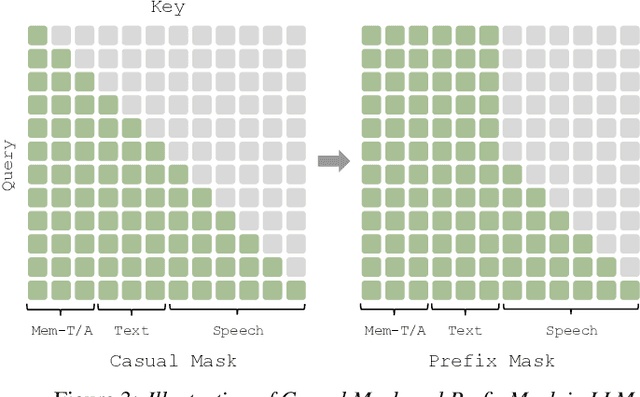
Abstract:In long-text speech synthesis, current approaches typically convert text to speech at the sentence-level and concatenate the results to form pseudo-paragraph-level speech. These methods overlook the contextual coherence of paragraphs, leading to reduced naturalness and inconsistencies in style and timbre across the long-form speech. To address these issues, we propose a Context-Aware Memory (CAM)-based long-context Text-to-Speech (TTS) model. The CAM block integrates and retrieves both long-term memory and local context details, enabling dynamic memory updates and transfers within long paragraphs to guide sentence-level speech synthesis. Furthermore, the prefix mask enhances the in-context learning ability by enabling bidirectional attention on prefix tokens while maintaining unidirectional generation. Experimental results demonstrate that the proposed method outperforms baseline and state-of-the-art long-context methods in terms of prosody expressiveness, coherence and context inference cost across paragraph-level speech.
Qwen2.5-Omni Technical Report
Mar 26, 2025



Abstract:In this report, we present Qwen2.5-Omni, an end-to-end multimodal model designed to perceive diverse modalities, including text, images, audio, and video, while simultaneously generating text and natural speech responses in a streaming manner. To enable the streaming of multimodal information inputs, both audio and visual encoders utilize a block-wise processing approach. To synchronize the timestamps of video inputs with audio, we organize the audio and video sequentially in an interleaved manner and propose a novel position embedding approach, named TMRoPE(Time-aligned Multimodal RoPE). To concurrently generate text and speech while avoiding interference between the two modalities, we propose \textbf{Thinker-Talker} architecture. In this framework, Thinker functions as a large language model tasked with text generation, while Talker is a dual-track autoregressive model that directly utilizes the hidden representations from the Thinker to produce audio tokens as output. Both the Thinker and Talker models are designed to be trained and inferred in an end-to-end manner. For decoding audio tokens in a streaming manner, we introduce a sliding-window DiT that restricts the receptive field, aiming to reduce the initial package delay. Qwen2.5-Omni is comparable with the similarly sized Qwen2.5-VL and outperforms Qwen2-Audio. Furthermore, Qwen2.5-Omni achieves state-of-the-art performance on multimodal benchmarks like Omni-Bench. Notably, Qwen2.5-Omni's performance in end-to-end speech instruction following is comparable to its capabilities with text inputs, as evidenced by benchmarks such as MMLU and GSM8K. As for speech generation, Qwen2.5-Omni's streaming Talker outperforms most existing streaming and non-streaming alternatives in robustness and naturalness.
IntrinsicVoice: Empowering LLMs with Intrinsic Real-time Voice Interaction Abilities
Oct 09, 2024



Abstract:Current methods of building LLMs with voice interaction capabilities rely heavily on explicit text autoregressive generation before or during speech response generation to maintain content quality, which unfortunately brings computational overhead and increases latency in multi-turn interactions. To address this, we introduce IntrinsicVoic,e an LLM designed with intrinsic real-time voice interaction capabilities. IntrinsicVoice aims to facilitate the transfer of textual capabilities of pre-trained LLMs to the speech modality by mitigating the modality gap between text and speech. Our novelty architecture, GroupFormer, can reduce speech sequences to lengths comparable to text sequences while generating high-quality audio, significantly reducing the length difference between speech and text, speeding up inference, and alleviating long-text modeling issues. Additionally, we construct a multi-turn speech-to-speech dialogue dataset named \method-500k which includes nearly 500k turns of speech-to-speech dialogues, and a cross-modality training strategy to enhance the semantic alignment between speech and text. Experimental results demonstrate that IntrinsicVoice can generate high-quality speech response with latency lower than 100ms in multi-turn dialogue scenarios. Demos are available at https://instrinsicvoice.github.io/.
CosyVoice: A Scalable Multilingual Zero-shot Text-to-speech Synthesizer based on Supervised Semantic Tokens
Jul 09, 2024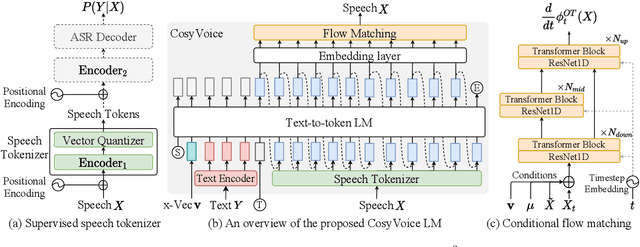
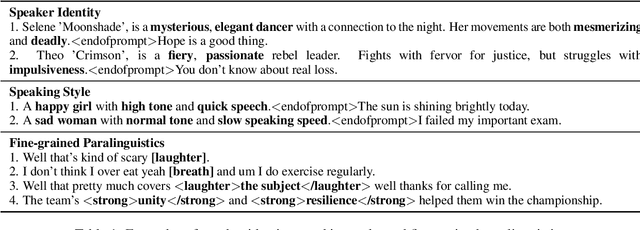
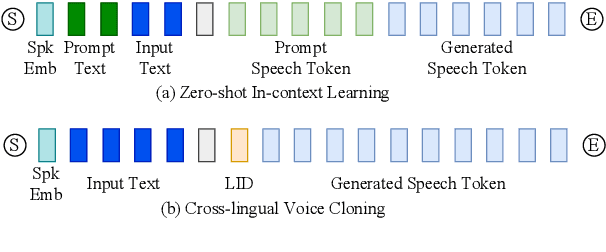
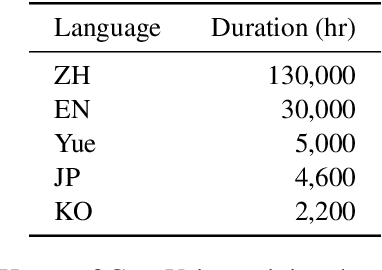
Abstract:Recent years have witnessed a trend that large language model (LLM) based text-to-speech (TTS) emerges into the mainstream due to their high naturalness and zero-shot capacity. In this paradigm, speech signals are discretized into token sequences, which are modeled by an LLM with text as prompts and reconstructed by a token-based vocoder to waveforms. Obviously, speech tokens play a critical role in LLM-based TTS models. Current speech tokens are learned in an unsupervised manner, which lacks explicit semantic information and alignment to the text. In this paper, we propose to represent speech with supervised semantic tokens, which are derived from a multilingual speech recognition model by inserting vector quantization into the encoder. Based on the tokens, we further propose a scalable zero-shot TTS synthesizer, CosyVoice, which consists of an LLM for text-to-token generation and a conditional flow matching model for token-to-speech synthesis. Experimental results show that supervised semantic tokens significantly outperform existing unsupervised tokens in terms of content consistency and speaker similarity for zero-shot voice cloning. Moreover, we find that utilizing large-scale data further improves the synthesis performance, indicating the scalable capacity of CosyVoice. To the best of our knowledge, this is the first attempt to involve supervised speech tokens into TTS models.
 Add to Chrome
Add to Chrome Add to Firefox
Add to Firefox Add to Edge
Add to Edge